A journey into the lives of Turkey’s mothers and daughters
Female travellers are forging meaningful connections with those harnessing the power of tourism on this fascinating women-only tour.
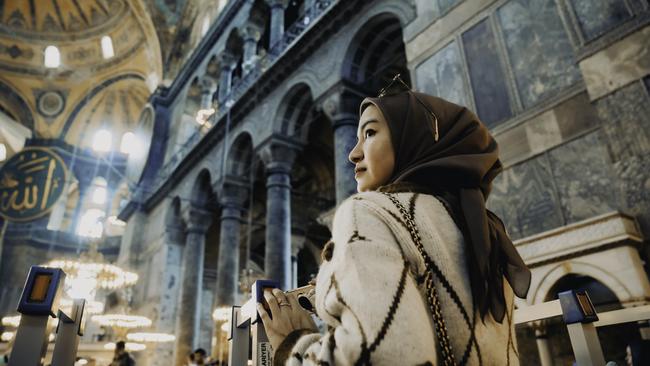
Turkey is awash with the feminine mystique. At Ephesus, the Amazon warriors’ legend fortifies the ancient foundations spilling towards the Aegean Sea. At Topkapi Palace in Istanbul, the ghosts of queens and concubines haunt the harem’s vaulted halls. Everywhere I go, women’s stories beckon me; they waft across kitchen tables and along winding roads and between the threads festooning looms hung heavy with their labour.
“You may not call them feminist, but in fact they are feminist because they are changing their neighbourhoods, the environment around themselves, and also they are educating their kids,” says Sengul Akcar, co-founder of the Foundation for the Support of Women’s Work (KEDV).
More recently, they’re tapping into tourism’s spoils. In a realm where women have operated largely as unskilled workers, KEDV is supporting their quests to become business owners.
“In the tourism sector in Turkey, 31 per cent are women, but it’s part-time. It’s not a decent job opportunity that provides for the woman,” Akcar says. “Now we set up guesthouses that are run by women in several parts of Turkey.”
READ MORE:How solo women travellers are taking on the world | Good things come in small packages in Tassie | The Portuguese town everyone’s talking about |
Just as Turkish women are harnessing tourism’s power, so Australian women are breaking new travel ground. Flight Centre reported recently that its average customer is a solo woman in her late 40s; Australian women also outspend men on instore transactions. This synergy between women with the means to travel and those hoping to make a living from tourism has prompted Australian company Intrepid to add a new Turkish itinerary to its women’s expeditions.
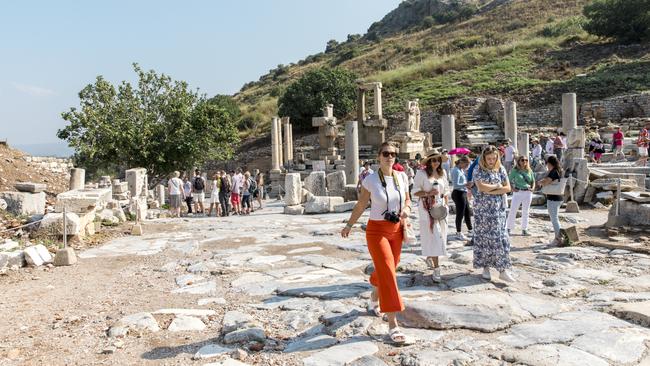
“Creating this branch really helped to give (women) access to meaningful jobs,” says Zina Bencheikh, managing director of Intrepid EMEA (Europe, Middle East and Africa). “I always like to say it’s both sides: for the customer and for the hosts, for the suppliers, for the tour guide. Creating an exchange between … women from two different cultures and backgrounds so they can both empower themselves and grow from that experience.”
My own awakening begins in Istanbul’s Beyoglu district, where the sunrise call to prayer flows across rooftops and rouses dwellers from their slumber. The city’s ubiquitous cats make way, reluctantly, for foot traffic and greengrocers’ wares. Bakery windows amass with towers of fresh baklava; they’re tempting, but a “mother-made” breakfast awaits me at No.11 Hotel & Apartments, up a narrow laneway. There are pastries dusted with sesame seeds and mahlep spice, wedges of halva, and tomato doused in olive oil and pomegranate molasses.
Unusually, the hotel was founded by a woman. It’s also the country’s first small independent hotel to receive an international eco-label, a goal provoked by founder Ayse Zeynep Sezerel’s experience at an Istanbul Biennial exhibition in 2019.
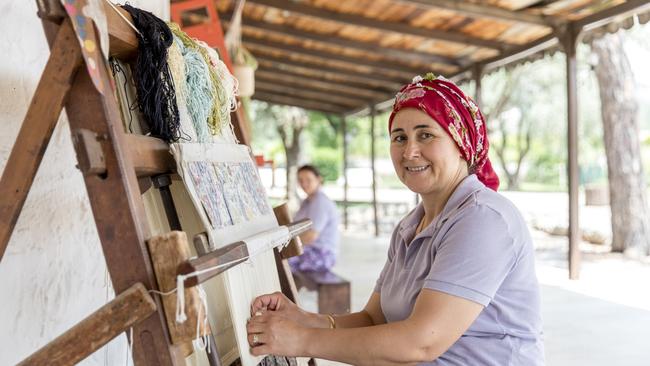
“It was called The Seventh Continent, a continent made of waste in the ocean. I saw those plastics dancing in the middle of the Pacific and I said, ‘I have to do something’,” Zeynep Sezerel recalls. “The day after, I turned up and banned all single-use products as a first step.”
The hotel’s rooftop, once an enclosed floor, now houses a rainwater tank, worm farm and produce that will be plucked and used in the kitchen.
“The roof was wooden. I took all that wood and made the bar downstairs,” she says. “It was my first upcycling project.”
Such autonomy is contrasted starkly across the Golden Horn at Topkapi Palace, where the girls and women brought into the imperial harem made the most of their cloistered state.
“These are special girls – they can make carpets, they can design mother of pearl, they are (focused on) reading and writing,” says tour leader Aysenur Genc. “They are working hard.”
The “lucky” few would marry a sultan and give birth to an heir. These rare Valide Sultans (queen mothers) comprised a “Sultanate of Women” whose influence, some historians believe, helped shape the Ottoman Empire. Today, the floriated tiles encasing the walls find expression in the headscarves – once banned in public workplaces and institutions – making a comeback in Turkey: colourful, silky, pinned beneath the chin.
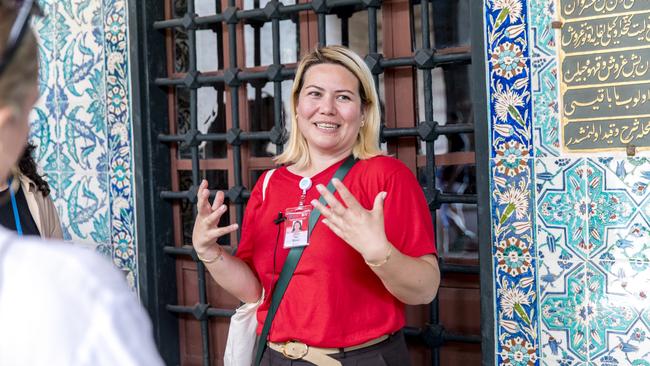
Kurdish woman Serya Olcer wears a dark hijab today; her daughter Gulcan – who is studying for her university entrance exams – eschews the headwear altogether. The pair has prepared a “golden lunch” for us in their home. The feast replicates the ritualistic gathering of Turkish women at one another’s homes and the gifting of gold coins to the host in order to supplement her personal income. Olcer’s husband is a hotel cook; her own entrepreneurial endeavour enables her to benefit from tourism’s windfalls too, she says.
“She’s from Batman city, and (there) the Kurdish people have guests every day,” Genc translates. “It’s extra money for the kids – she has two daughters and one boy.”
Olcer offers glasses of tea and turnip juice, platters groaning with indulgences – dolma, sun-dried eggplant, feta-filled pogaca – and insight into these secretive gatherings.
“This is the easiest way to get social, to see someone else,” Genc says. “If they’re working, it’s the meditation time, it’s the friends’ time, it’s sharing time. If they’re not working … still they’re just doing the housework, they’re caring for the kids … this is how they feel better.”
The value of female empowerment unfolds in Genc’s own story on the drive to Adatepe in Anatolia, south of Istanbul. When she was nine, Genc met a tour guide on a family coach trip to Antalya.
“We talked eight hours straight,” she recalls. “I said, ‘This is what I’m going to do when I grow up’.”
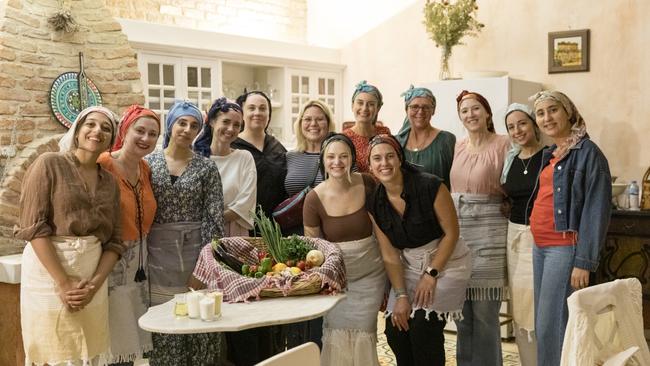
Her determination reaped dividends. After four years of study, Genc was granted a coveted tour guiding licence – a notable feat in a country where about 70 per cent of guides are men.
“It still is a man’s world,” she says, “but they cannot control strong women like in the old days. It’s changing.”
Next morning, Istanbul dissolves behind us in a blur of apartment blocks and lofty minarets. Urbanity gives way to golden fields of wheat; the green-tipped shoots of sunflower and barley crops herald spring. Out here on the open road, driver Fatma Celik Karakol hits her stride. She became Turkey’s first female ambulance driver in 1994, and today runs her own transport company.
“She learned to drive the old cars in her village, because her parents are farmers. She can drive the tractors, she can drive the trucks,” Genc says.
We’re in safe hands as we glide from Europe into Anatolia (Asia Minor). Celik Karakol navigates the winding streets of Adatepe, a former Greek village tucked into foothills fringed with centuries-old olive trees. High on a ridge sits Zeus’s Altar, from which the god is said to have watched the Fall of Troy. The outlook is incongruent with the violent mythology: a seaboard sweeping tranquilly towards Edrimit Bay; the isle of Lesbos, suffused with Sappho’s lore.
Across the bay in the cobblestoned city of Ayvalik, American Tara Hopkins wears a dress made from a flour sack. It’s an elegant one-off created by a member of cop(m)adam, the social enterprise Hopkins established to enable women who’ve never worked for a salary to earn a living. They transform similar throwaway materials – grain sacks, advertising flags, denim – into beautiful, utilitarian objects. Hopkins, who moved to Turkey 33 years ago to lecture in civic participation at a university, struck upon the idea after an episode of burnout. Wondering if it was time for her to leave the country, she instead reset her perspective and decided to use her skills. Fifteen years later, more than 500 women have worked with cop(m)adam, Coca-Cola and Unilever among them.
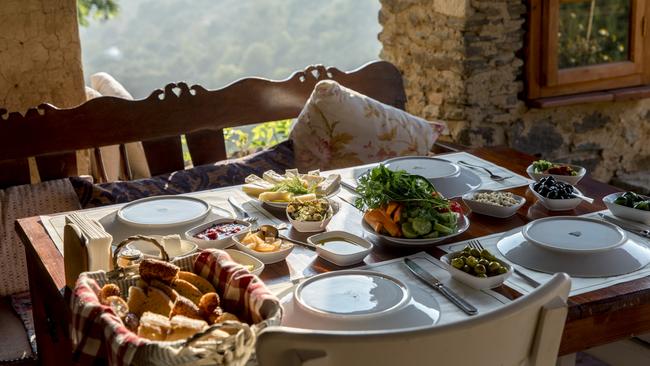
“Some of our women have put their kids through school with the money they’ve earned here,” Hopkins says. “There have always been opportunities (but) the width, the breadth of them has really expanded. Things are changing, slowly, slowly.” These changes manifest in the silk carpet taking form beneath Gol Cennet Baba’s deft fingers in the village of Camlik, a few hours’ drive south. Her talent is nurtured here at Sultankoy, a women’s social enterprise dedicated to preserving the craft and upholding fair work conditions. Ninety per cent of Turkey’s weavers are women, says Sultankoy spokesman Emre Aaron; small fingers, sharp eyesight and patience give them the edge. But the country’s recent earthquakes ravaged their livelihood.
“We used to have around 3875 weavers around Turkey. I think we lost half of them,” he says. “Some of them did lose their life, unfortunately. And some … lost their merchandise, stuff like weaving tables or their houses, so they quit their jobs.”
The motifs in Cennet Baba’s creation – birds, flora, arabesques rendered in hand-dyed thread – are evoked nearby at Ephesus. Here, the winged goddess Nike grasps a wreath in one hand, a feather in the other. Was it Androklus, son of the king of Athens, who founded this ancient city, or the Amazons, those female warriors from the Black Sea? Genc doesn’t falter.
“I strongly believe Amazon women were here first,” she says. “We are in the centre of women’s empowerment.”
IN THE KNOW
Intrepid’s 12-day Turkey Women’s Expedition runs April to October 2024; from $4705 a person, twin-share. Single supplement, $920.
For more on KEDV’s guesthouse project visit the website. Visit the cop(m) adam shop at 13 Nisan Cd. No 1, Ayvalik.
Catherine Marshall was a guest of Intrepid.

To join the conversation, please log in. Don't have an account? Register
Join the conversation, you are commenting as Logout